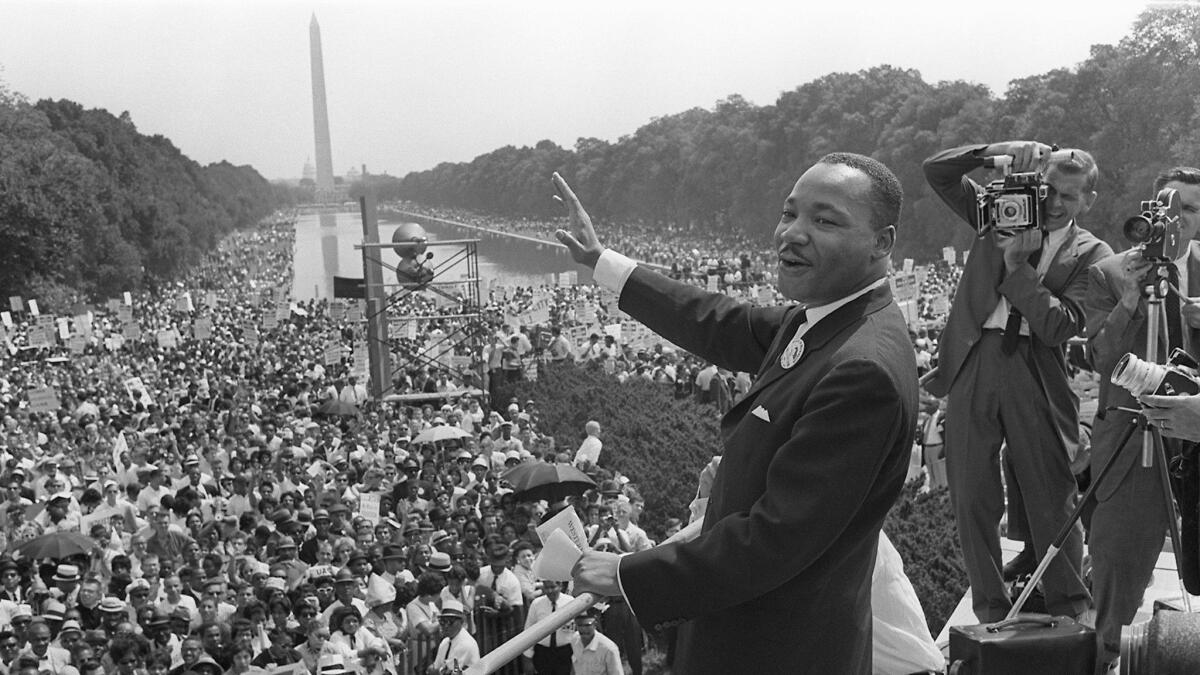Editorial: We celebrate MLK for trying to rescue America’s soul. Steve King reminds us the job still isn’t finished

- Share via
Since when, Rep. Steve King of Iowa wanted to know, were the terms “white supremacist” or “white nationalist” offensive?
It was a rhetorical question he lobbed at a reporter for the New York Times, and he threw “Western civilization” into the mix, making clear his belief that racial supremacy and race-oriented nationhood are inseparable from the long march of European and American intellectual and social development.
It capped a long résumé of racist lines from the nine-term Republican congressman. For example, take this tweeted nugget from 2017: “We can’t restore our civilization with somebody else’s babies.”
But in the unlikely event that King’s question was sincere, here’s a reminder. Those words have always been deeply offensive to the essential American creed: that all men are created equal.
In observing Martin Luther King Jr.’s birthday we acknowledge him, like Lincoln, as a rescuer of the national creed and therefore one of the founders.
That creed is no less legitimate for having been articulated by slave-owning white men at the nation’s founding. They expressed high ideals, though they lacked the courage of their convictions and left it to future generations to perfect a nation that could match its principles.
Abraham Lincoln said as much on the Gettysburg battlefield, when he called for a “new birth of freedom” to complete the unfinished work of the founders.
And the Rev. Martin Luther King Jr. made the same point 100 years later, standing on the Lincoln Memorial where the slain president’s words are inscribed.
“I have a dream,” King said, “that one day this nation will rise up and live out the true meaning of its creed: ‘We hold these truths to be self-evident, that all men are created equal.’”
King sometimes seems as distant from today’s world as Lincoln must have seemed to the hundreds of thousands of people listening to King speak during the March on Washington in 1963. Yet it is conceivable that, had he not been murdered on a motel balcony in Memphis on April 4, 1968, King would be alive today and celebrating in the aftermath of his 90th birthday, which would have been last Tuesday, and which is being observed today with a national holiday.
What would Martin Luther King think of that other King — the congressman from America’s heartland — and his articulation of a hateful alternative creed of racial supremacy and race-based nationalism, whose adherents continue to plague the United States by pushing back against the lofty ideals to which most of the nation still aspires?
The civil rights leader would no doubt find the congressman’s attitude familiar. What might depress him — and what ought anger the rest of us — is the response. Last week, House Minority Leader Kevin McCarthy (R-Bakersfield) finally stripped the Iowa representative of his committee assignments in an effort to distance the party of Lincoln from white supremacy. That’s good, but it took too many years to reach that point. Republican leaders have long tolerated not just Steve King but President Trump, whose words — about white supremacists in Charlottesville, Central American migrants, a U.S.-born judge of Mexican descent, African American leaders and others — give aid and comfort to the racists among us.
In his historic Letter From Birmingham Jail, Martin Luther King Jr. acknowledged the danger of blatant and violent racism but expressed special exasperation with those supposed non-racists who witness overt racism and are slow to respond.
Enter the Fray: First takes on the news of the minute »
“I have almost reached the regrettable conclusion,” he wrote, “that the Negro’s great stumbling block in his stride toward freedom is not the White Citizen’s Counciler or the Ku Klux Klanner, but the white moderate, who is more devoted to ‘order’ than to justice. … Shallow understanding from people of good will is more frustrating than absolute misunderstanding from people of ill will.”
And as much as King praised Lincoln during the March on Washington for having signed the Emancipation Proclamation, he noted years later in his final speech the president’s “vacillating” before finally taking the action.
The founding of the nation was not completed in 1776 or 1865 or 1963. It must be re-founded every day, in the face of attempts to prevent it from living out the true meaning of its creed that all men — all people — are created equal.
In observing Martin Luther King Jr.’s birthday we acknowledge him, like Lincoln, as a rescuer of the national creed and therefore one of the founders. The words of that other King — the one from Iowa — remind us that the job still isn’t finished.
Follow the Opinion section on Twitter @latimesopinion and Facebook
More to Read
A cure for the common opinion
Get thought-provoking perspectives with our weekly newsletter.
You may occasionally receive promotional content from the Los Angeles Times.










